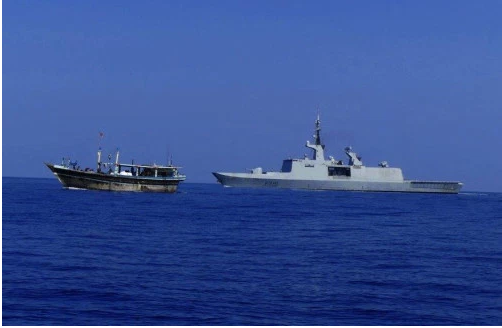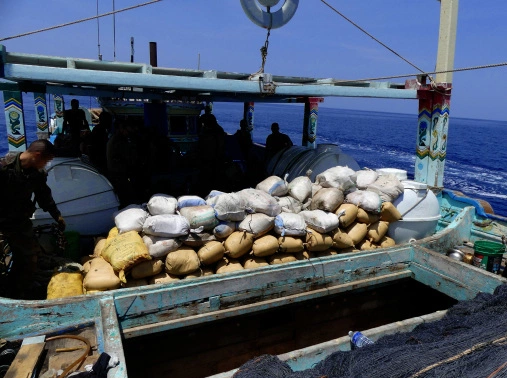Indian Ocean HRA Overview
Continued reported incidents reflect that the HRA remains a threat in regards to piracy activity in the region. Recent efforts to improve the security environment will reduce the impact of Somali piracy, however, continuing deterioration of onshore conditions in Somalia and Yemen such as famine, terrorist groups, a weak central government and poor governance of coastal areas continue to influence piracy in the region. Pirate financiers capitalise on the chaos offering opportunities to local people. Piracy groups onshore Somalia still bear the motivation to try and carry out attacks and still with capability to target merchant vessels. Increasingly, vessels in the HRA are subjected to incidents that appear to be co-ordinated small boat piracy approaches however they choose not to ultimately attack. These incidents are then difficult to classify as attempted piracy or simply as regional patterns of life in the area. However, as seen in recent months there have been numerous attacks and attempted boarding’s ranging from incidents in the Somali Basin, Gulf of Oman, Gulf of Aden and the Southern Red Sea. The increased presence of naval patrols and armed security on board vessels act as a deterrent to the threat of piracy, however those vessels transiting in the area without the presence of armed security remain a significant risk.
Reported Incidents HRA
No incidents to report (UKMTO)
The Combined Maritime Forces (CMF) reported on the 19th April that the La Fayette frigate seized 1940kgs of hashish during a patrol in support of CMF on the 17th April. La Fayette’s seizure is the fourth for the French navy in support of the Combined Task Force 150 (CTF 150). Multinational assets in support of CTF 150 have seized 30 tonnes of hashish and 2.5 tonnes of heroin, valued in excess of $2.3 billion.
The frigate detected a dhow of interest and closed in to investigate further. Following a boarding a search took place locating 1940 kgs of hashish with a street value of over $75 million. The illegal drugs were transferred to the La Fayette to be destroyed at sea. The boarding was conducted in the international waters of the Middle East. (Source: Combined Maritime Forces)
CMF conducts maritime security operations in order to ensure the free flow of legitimate commerce in the Middle East and to deny the use of the high seas to terrorist and illicit non-state actors. Recent large drug seizures in the Arabian Sea highlight the shipments heading in southerly flows are likely to be travelling to regions in East Africa. These regions are used predominantly as transit zones and have a direct impact on the operations of terrorist organisations. The naval task force seeks to disrupt smuggling networks transferring illicit narcotics from Central Asia through to East Africa.
Yemen Update
This Week
Houthis reported to have detained 19 oil tankers preventing them from entering Hudaydah port: The Saudi Ambassador to Yemen stated that Houthi militias have detained 19 oil tankers carrying 200,000 mt of petroleum by-products for over 26 days off the port of Hudaydah, preventing them from entering the port. Further reports state that there is a fear of Houthi militias destroying these vessels which would create an environmental disaster in the Red Sea. However these reports have not been verified by external sources.
Airstrike kills prominent Houthi leader in al-Hudaydah: The Gulf Cooperation Council (GCC) conducted air strikes in al-Hudaydah, Yemen, killing prominent Houthi leader Saleh al-Samed who was second on the list of most wanted Houthi targets. (Source: Middle East Eye)
Ongoing Threat of Violence/Terrorism at Sea off the Coast of Yemen
- Yemen’s civil war has created an environment mirroring Somalia’s lawlessness. The ongoing conflict in Yemen demonstrates how poor security on land has led to violence spilling out into the maritime domain. Houthi rebels continue to control a large amount of Yemen’s red sea coastline.
- In relation to coalition forces advancing towards the Red Sea port city of Hudaydah, currently under Houthi rebel control, increases the risk to shipping in the region. In the past Houthi rebels have repeatedly threatened to attack merchant vessels in the region should coalition forces attempt to re-take Hudaydah port. If coalition forces seized Hudaydah it could be argued this would be a turning point in the civil war as the Houthi rebels would lose their main source of finance through the port in which illegal arms are smuggled.
- Unconfirmed reports surfaced on the 7th January 2018 stating that the Saudi coalition had destroyed at least one Houthi vessel near Hudaydah port after an alleged attack occurred against a Saudi oil tanker. The vessel was reported to be loaded with explosives and controlled remotely.
- The threat of terrorism at sea off the coast of Yemen remains by rebel groups and terrorist organisations such as AQAP remains. Such is highlighted by attacks against the LNG Tanker Galacia Spirit in October 2016 and the MT Muskie a product tanker in May 2017. Both involved the use of explosive laden skiffs, as an attempt to cause major devastation in the critical international shipping passage of the Bab-el-Mandeb.
- It continues to be a persistent threat that merchant vessels may be the subject of a miscalculated attack or as has been suggested recently, possibly threats of a calculated attack.
- The continued proliferation of weapons in Yemen increases the possibility that rebel and other groups may seek to conduct an attack against shipping using WBIED’s.
Somalia Update
This Week
Weapons stolen from training facility in Somalia, sold on open market: It has been reported that at least 600 weapons were stolen in the past week from a former UAE run training center in Mogadishu and are on sale in the city. The UAE ended the training programme on the 15th April shortly after security forces at Mogadishu’s airport seized millions of dollars from a UAE plane. The UAE trained troops began stealing the weapons from the facility shortly after programme was ended. The looting appeared to have happened while the UAE were in the process of emptying its training center. It was reported a ship docked at Mogadishu’s port was loaded with containers of weapons, armoured vehicles and cars. (Source: Times LIVE)
Al Shabaab has been increasingly active in Somalia in recent months. The militant group has been battling the Somali Federal Government (SFG) in an effort to govern Somalia. Since 2013, al Shabaab pledged allegiance to al-Qaeda attracting the United States to execute raids and airstrikes against the group. However increased US airstrikes have not enabled African Union Mission (AMISOM) and Somali security forces to gain enough momentum against the terrorist group, al Shabaab has not suffered any great loss of territory or significant casualties from the airstrikes. Al Shabaab continues to maintain strongholds in southern and central Somalia and continue to carry out attacks against military and civilian targets. Somalia is a country whereby tribal loyalties are stronger than national ties. The SFG and Somali forces lack legitimacy outside of Mogadishu. Further to this, al Shabaab further exemplifies the issue of famine, terrorism and corruption making the prospect of stability in Somalia in the near future bleak. Al Shabaab is likely to maintain its present operational tempo in 2018 and further expand its territory in central and southern Somalia.
Piracy
In 2017 between March and May, five vessels were hijacked in Somali waters, whilst this was reported by many to be a resurgence of Somali piracy, it can be assessed as more likely to be a result of a permissive environment during the inter-monsoon period allowing skiffs and PAGS to operate with ease. Until the deep rooted issue of piracy in Somalia are resolved, piracy will continue to be a threat. 2017 saw the worst drought Somalia has seen in 40 years, this coupled with the struggling government and extreme militant violence has brought 6.7 million people into crisis. Pirate financiers capitalise on the chaos offering opportunities to local people. Pirate groups are known to operate in the coastal regions of Puntland, namely Eyl and further south in the Galmudug region, namely Hobyo. It is needless to say, as the increased instability in Somalia continues, it will serve as a permissive environment for piracy operations with an ongoing threat to shipping in the region.



